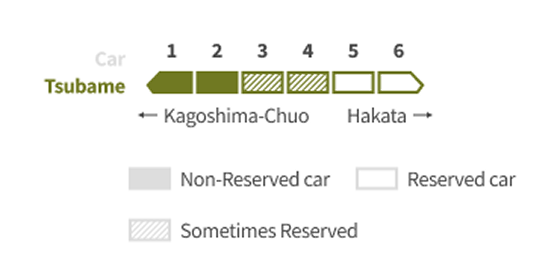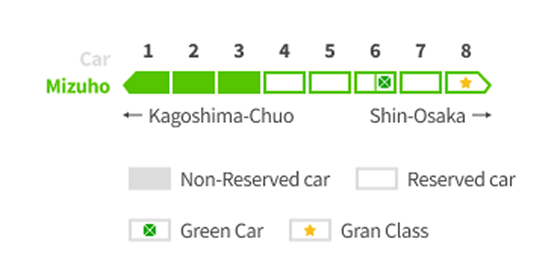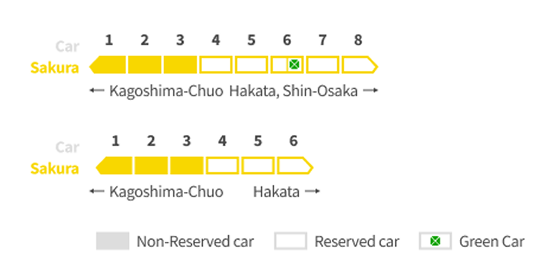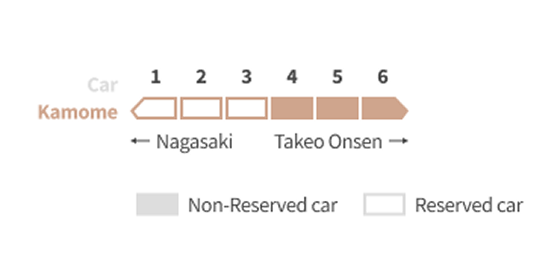Ready to discover all that Kyushu has to offer? You can use your Japan Rail Pass to travel to and around Kyushu in style via the Shinkansen bullet train.
The Kyushu Shinkansen connects the cities of Fukuoka and Kagoshima. In this way, it also provides a rapid connection between the northern and southern portions of the siland.
Kyushu is Japan’s southernmost island, and offers numerous attractions for travelers. Along the Kyushu Shinkansen line, you’ll find vibrant cities like Kurume and Kumamoto, along with more traditional towns. You’ll also have the opportunity to explore the island’s nature, including beaches, hot springs and volcanoes.
Table of Contents
Kyushu Shinkansen Map

Kyushu Shinkansen stops
The Kyushu Shinkansen Line runs from Hakata Station in the north to Kagoshima-Chuo Station in the south. Interim stations include Shin-Tosu Station, Chikugo-Funagoya Station, Shin-Omuta Station, Shin-Tamana Station, Kumamoto Station, Shin-Yatsushiro Station, Shin-Minamata Station, Izumi Station, and Sendai Station in Kagoshima.
Several train services operate on this line, including Tsubame, Mizuho and Sakura trains.
| Station | Transfers | Prefecture |
| Hakata Station | Kūkō Line (Fukuoka City Subway), Fukuhoku Yutaka Line, Hakata-Minami Line, Kagoshima Main Line, Sanyo Shinkansen. |
Fukuoka |
| Shin-Tosu | Nagasaki Main Line. | Saga |
| Kurume Station | Kagoshima Main Line, Kyūdai Main Line. | Fukuoka |
| Chikugo-Funagoya Station | Kagoshima Main Line. | Fukuoka |
| Shin-Omuta Station | Fukuoka | |
| Shin-Tamana Station | Kumamoto | |
| Kumamoto Station | Hōhi Main Line, Kagoshima Main Line Kumamoto City Tram. |
Kumamoto |
| Shin-Yatsushiro Station | Kagoshima Main Line. | Kumamoto |
| Shin-Minamata Station | Hisatsu Orange Railway Line. | Kumamoto |
| Izumi Station | Hisatsu Orange Railway Line. | Kagoshima |
| Sendai Station | Hisatsu Orange Railway Line, Kagoshima Main Line. | Kagoshima |
| Kagoshima-Chūō | Ibusuki Makurazaki Line, Kagoshima Main Line, Kagoshima City Tram. | Kagoshima |
Nishi Kyushu shinkansen stops
The Nishi Kyushu Shinkansen serves as an extension of the Kyushu Shinkansen line.
The Nishi Kyushu Shinkansen line currently runs between Takeo-Onsen and Nagasaki Station, spanning a distance of approximately 66 kilometers. The Kamome train service is currently the only Shinkansen service operating on this line.
You can find the stations currently serviced by the Nishi Kyushu Shinkansen below.
| Station | Transfers | Prefecture |
| Takeo-Onsen | Sasebo Line | Saga |
| Ureshino-Onsen | Saga | |
| Shin-Ōmura | Ōmura Line | Nagasaki |
| Isahaya | Nagasaki Line, Ōmura Line, Shimabara Railway Line | Ngasaki |
| Nagasaki | Nagasaki Line, Ōmura Line, Nagasaki Electric Tramway | Nagasaki |
Please note that the Nishi Kyushu Shinkansen does not currently offer a direct connection from Hakata Station to Nagasaki.
To travel between these destinations, board the Relay Kamome limited express train to Takeo-Onsen Station. Here, you can easily switch to the Shinkansen on the adjoining platform.
It is not yet known when the full extension will be opened. However, once the full extension is completed, the entire journey between Hakata Station in Fukuoka and Nagasaki will only take around 30 minutes.
Train Services
On the Kyushu Shinkansen line we find 3 operational train services: Mizuho, Sakura and Tsubame Shinkansen, ordered from fastest to slowest.
The first train leaves Hakata Station (Fukuoka) around 6 a.m., and the last one of the day departs around 10 p.m. You can check all schedules on the Navitime planner website.
Tsubame Shinkansen
Tsubame is the slowest service on the Kyushu Shinkansen line. There are no Green Car seats on this train category. The operating speed of Tsubame trains is 260 km/h (160 mph). A trip from Kagoshima-Chuo to Hakata with the Tsubame train will take you approximately 1 hour 45 minutes.

This services stops at all stations on the line between Hakata and Kagoshima-Chūō. Below is a timetable with the first and last departure from each station.
Mizuho Shinkansen
Mizuho trains are considered an express service, stopping at only one station – Kumamoto – between Hakata and Kagoshima-Chuo Stations. The Mizuho trains make about five round trips per day. This journey takes approximately 1 hour 15 minutes.
Please note that Mizuho trains are covered under the Kyushu Rail Pass. Additionally, you can ride these trains with your JR Pass from by paying a supplement.

Sakura Shinkansen
The Sakura depart once an hour throughout the day between Hakata and Kagoshima-Chūō, making more stops than the Mizuho, with a travel time of 1 hour 35 minutes.
The Sakura Shinkansen serves most of the larger stations on the line, with fewer stops than the Tsubame service. Some Sakura trains also continue on to Shin-Osaka Station.

Kamome Shinkansen
The only service currently running on the Nishi Kyushu line is the Kamome Shinkansen.
The Kamome Shinkansen service currently runs between Takeo-Onsen and Nagasaki Station, spanning a distance of approximately 66 kilometers.

Ticket Prices
Train fares in Japan can fluctuate depending on the time of day, seat type, and when you book. However, the following are standard one-way prices on the above services for 1 adult:
| Train | Route | Standard One-Way Price |
| Tsubame | Hakata → Kagoshima-Chūō | from 14,150 JPY |
| Sakura | Hakata → Kagoshima-Chūō | from 14,150 JPY |
| Mizuho | Hakata → Kagoshima-Chūō | from 14,150 JPY |
| Kamome | Takeo-Onsen → Nagasaki | 6,000 JPY |
Tokyo to Fukuoka by Shinkansen
To get from Tokyo to Fukuoka, you can take the Tokaido Shinkansen toward Shin-Osaka, where it connects with the Sanyo Shinkansen line all the way to Fukuoka. The trip from Tokyo to Fukuoka takes 5 to 6 hours.
Fukuoka to Nagasaki, connecting Kyushu and Nishi Kyushu shinkansen
The Nishi-Kyushu Shinkansen line does not offer a direct route from Hakata Station to Nagasaki. Instead, travelers can make the journey using a combination of services.
To travel from Fukuoka to Nagasaki start by boarding the Relay Kamome limited express train from Hakata to Takeo-Onsen Station. There, you can conveniently transfer to the Kamome Shinkansen, continuing on to Nagasaki.
This connection bridges the Kyushu and Nishi-Kyushu Shinkansen lines. While there’s no official date for the completion of the full extension, once finished, the entire trip from Fukuoka to Nagasaki is expected to take just around 30 minutes.
Kyushu Shinkansen with JR Pass
You can activate your JR Pass for use by visiting a ticketing counter in many of the major train stations. Along the Kyushu Shinkansen Line, these include:
- Hakata Station
- Kumamoto Station
- Kagoshima-Chuo Station
Reserved seating is available on each of the Kyushu Shinkansen train classes. If you wish to use reserved seating, be sure to make your seat reservations in advance by visiting a ticketing counter. Whether or not you are using reserved seats, be ready to present your JR pass at the departure gate.
JR Pass holders are able to ride on Mizuho trains. However, you will need to pay a supplemental charge to use these services.
